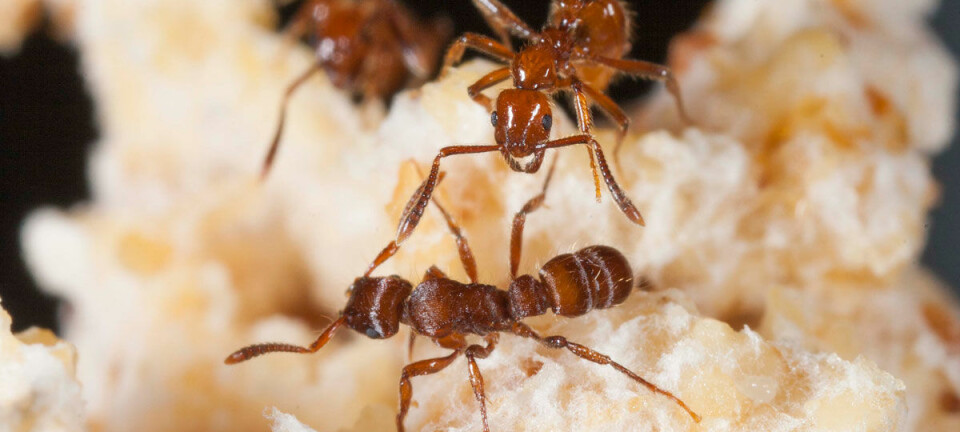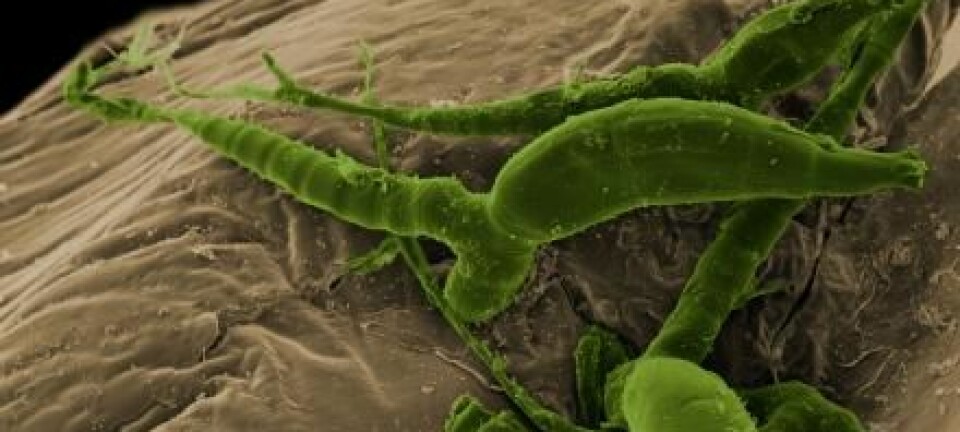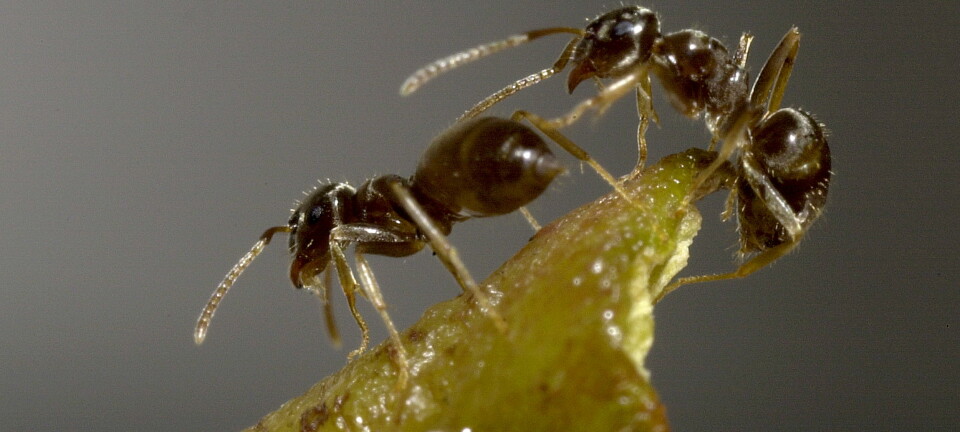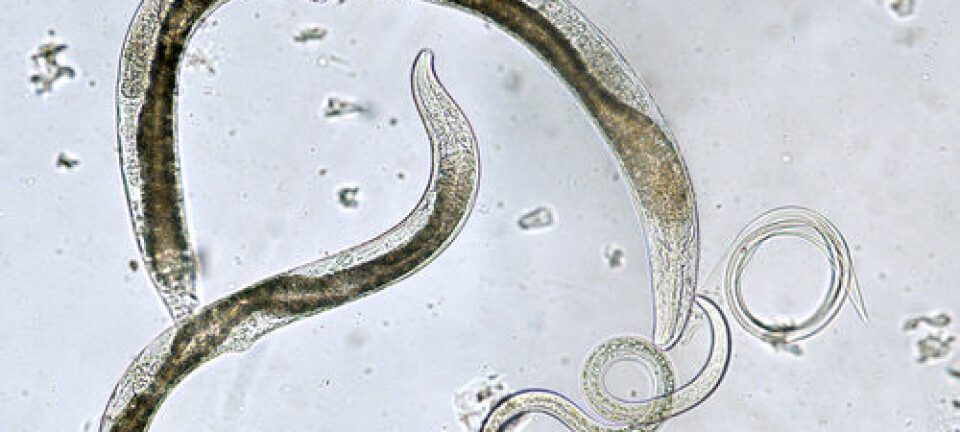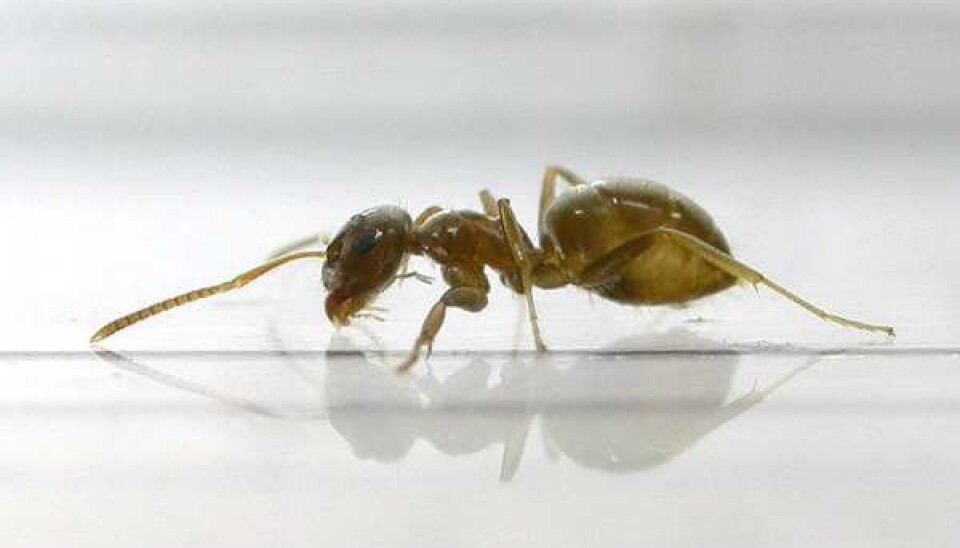
Ants care for their sick to avoid epidemics
Even though ants live and work close together in colonies, their nests are rarely hit by epidemics.
Epidemics are incredibly rare in the ant world, and new research indicates that one secret behind ants’ effective disease control is a good clean-up.
“The ants clean themselves and others. We can see that when an individual falls ill, the other do more to keep it clean. The sick ants also reduce their contact with the others,” explains Dane Line Vej Ugelvig, a postdoc at the Institute of Science and Technology Austria near Vienna. She is one of the scientists behind the new study.
Epidemics rarely strike ant colonies
The study was completed because the researchers were wondering about why ant nests are not hit by disease outbreaks.
“We know of practically no diseases capable of killing entire ant nests or ant populations. This is incredible, considering that ants live so close together, share the same genetic background, and are in such frequent contact with each other. So you’d think that disease would spread pretty quickly though a nest,” says Ugelvig.
In the new study, Ugelvig and her colleagues did experiments on ants she had infected with the pathogenic fungus Metarhizium.
Cleanliness saves the ants
The researchers dripped fungal spores onto some of the ants and observed how other ants immediately set about removing the spores from the infected bodies.
“Cleaning means that the ants have a greater chance of survival than if they had to fend for themselves, simply because more spores are removed from their bodies. And in small doses the fungus is not lethal,” Ugelvig explains.
The Metarhizium fungus grow through the body of the ant one to two days after it is infected.
“But the other ants start cleaning the infected ant even before it has become ill and before the fungus has grown into the body. We believe it’s this early discovery of a disease that is decisive in preventing it from spreading through the nest,” says Ugelvig.
Sick young thrown out of the nest
The ants’ strategy when it comes to fighting disease is reminiscent of how we humans prevent outbreaks: early action is often decisive when it comes to successfully containing epidemics, Ugelvig points out.
If, however, the ants fail to rescue a flatmate from a fungal infection by cleaning it, they resort to more drastic measures.
“There would seem to be more than one step in their disease control strategy. The healthy ants initially attempt to clean sick individuals but if they fail in this endeavour – and the fungus has already grown into the ant – then the next step is to throw the sick ants out of the nest and thus preventing the disease from spreading to the others,” says Ugelvig.
She emphasises that apparently, only young ants are physically thrown out of the nest, while adult worker ants seem to accept voluntary exclusion from the colony.
Can ants smell disease?
Ugelvig is currently trying to figure out how the ants know that a specific individual in the colony is infected – even before the infection has manifested physically.
“I’m looking into whether sick individual smell different from healthy individuals. I’ve extracted substances from the bodies of the ants to examine whether there’s a difference between these substances depending on whether the ants are healthy, infected or sick – and what stage of the disease the ants have reached,” she says.
Although her analysis is not complete yet, Ugelvig points out that ants are already known to identify each other and to communicate using odoriferous substances.
Ants recognise each other by their smell
It is dark inside ant nests so visual signals are of no use in communication.
“Odoriferous substances can, for instance, indicate whether an ant is a queen or a worker, and whether it belongs in the nest. Every ant colony has its own special odour, so if you don’t give off that smell you get attacked,” says Ugelvig.
You might think that if an ant smells of disease it would best for the colony to throws it out of the nest immediatelys considering how important it is for the nest as a whole to survive.
According to Ugelvig, however, even though the healthy ants expose themselves to infection when they clean their sick flatmates, the cleaning process is worth it for the nest as a whole.
“From a statistical point of view we can see that cleaning only leads to a small number of deaths in the nest even though the healthy ants expose themselves to infection when they clean the sick – only two per cent of the healthy ants end up dead,” says Ugelvig.
Cleaning strengthens the ants’ immune system
In fact, when the healthy ants expose themselves to sick ants it actually seems to strengthen the ants’ ability to fight off disease later in life.
“We’ve previously done experiments which show that ants that have been in contact with sick individuals somehow become immune to the disease,” says Ugelvig.
“We see the same in people who become resistant to the diseases they have previously suffered from, but it is particularly noticeable in insects because their immune systems work differently than ours – we don’t yet know what mechanism it is that makes the ants immune. We are simply able to see that a minor infection that doesn’t kill them subsequently protects them against disease,” she says.
-------------
Read the original story in Danish on Videnskab.dk
Translated by: Hugh Matthews
